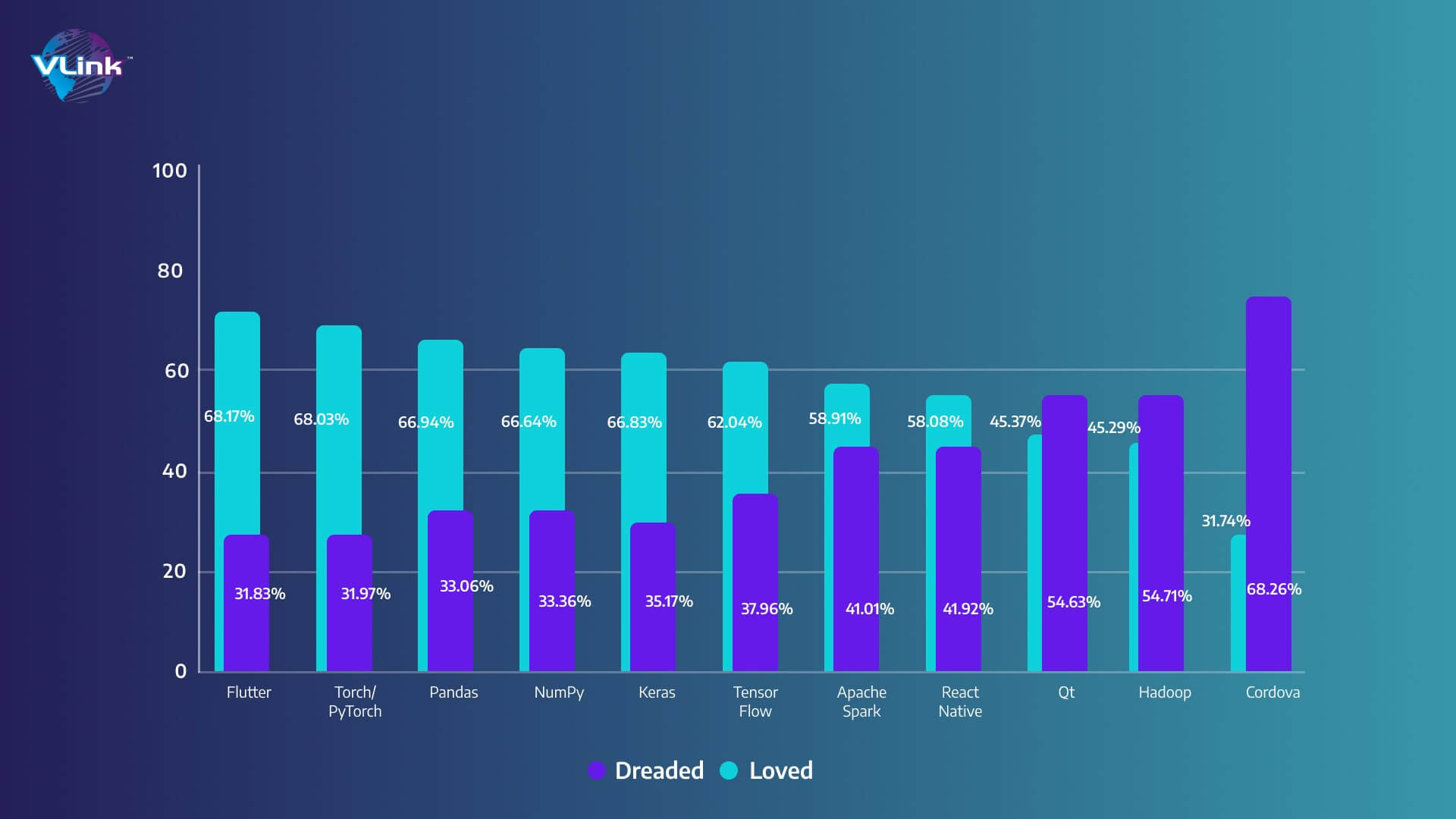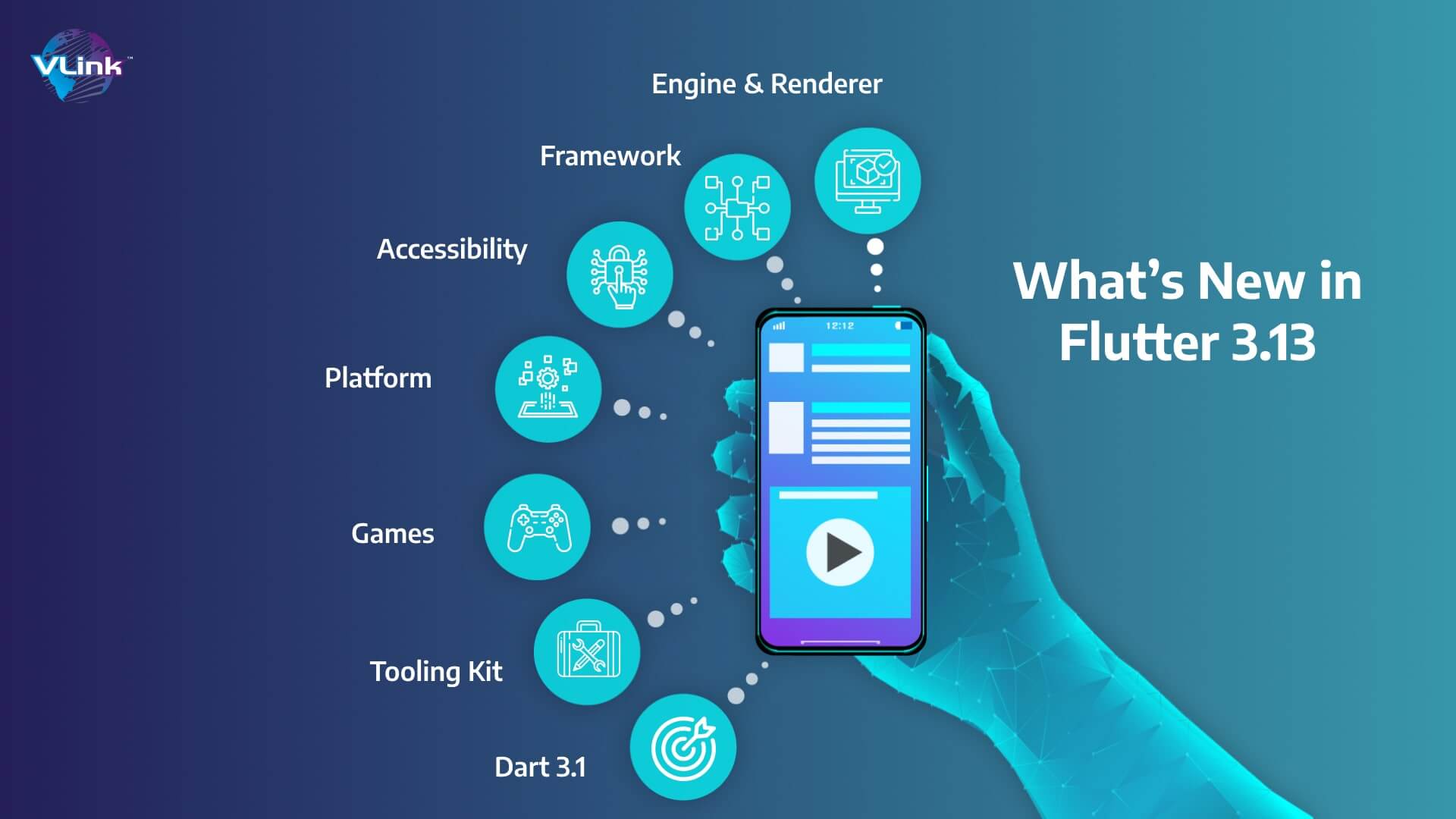Explore Flutter 3.13's advanced features including Impeller for Android & macOS, innovative text recognition, 2D scrolling, & Dart 3.1 in this blog.
Flutter was first launched in 2017 with fewer functionalities and support offered by Google Giant. Then, it's known as a corresponding, open-source UI mobile framework. Since then, Flutter, the Google UI/UX kit, has always surprised us. On 16 August 2023, it launched its new version, 3.13.
Flutter 3.13 version comes with several advanced features, including enhanced graphics, improved performance, more customisation options, an impeller and a unique and effective graphics renderer.
It also includes Dart 3.1, which enters you to build the next-gen application ecosystem. Along with many features, this latest version has many features for interface depth and rapid graphics.
In this blog, we will explore new features and enhancements the Flutter community has contributed to this latest version.
Here's a snapshot of the latest Flutter 3.13 version.
 Snapshot of Flutter 3.13 Version
Snapshot of Flutter 3.13 Version
- Engine & Renderer: Flutter introduces the Impeller renderer, which benefits from a new customized API for flexible devices, enhanced performance on iOS, and a macOS preview.
- Framework: The updates bring advanced iOS features, upgrades, and material design enhancements, along with creative scrolling options.
- Accessibility: A significant property update for better user interaction has been made to the cupertinoSwitch.
- Platform: Flutter 3.13 improves iOS aspects and supports for Android 14.
- Games: More resources for programmers are available with the launch, which expands the toolkit for game development.
- Tooling: DevTools significantly improves usability and performance.
What is Flutter 3.13?
Flutter 3.13 is the recent stable launch of the Flutter platform. It includes a number of new features and improvements of the Google-powered UI toolkit, such as fast iOS graphics, 2D scroll, and new silver classes.
What's New in Flutter 3.13 Version?

Engine & Renderer
Increased iOS Performance with Impeller
The Impeller renderer on iOS is now performing much better, thanks to Flutter 3.13. Comparing the Flutter Gallery transitions performance benchmark on an iPhone 11 to its predecessor, Skia, reveals a halving of the average frame rasterization time.
As a result, users will be more engaged and satisfied with the iOS device experience, which is guaranteed to be more responsive and seamless.
Fidelity Improvements
Adding to the 3.10 release, a number of colors that were previously exclusive to Impeller are now available as standard on iOS. This improvement improves apps’ visual appeal and increases user engagement.
Impeller on Android
Backend agnostic optimizations to Impeller's HAL over the past year have helped the OpenGL and Vulkan backends, though the Vulkan backend for Impeller on Android is still under development. It ensures optimal app performance across platforms and promises better app experiences for Android users in the near future.
Impeller on MacOS
Impeller is presently available in macOS preview and has got positive feedback from its iOS implementation. Flutter is showcasing its commitment to preserving consistent app performance on all Apple devices by improving the visual fidelity and responsiveness of apps for macOS users.
Foldable Devices Support
As foldable devices gain popularity, Flutter 3.13 presents a new API to recover several display properties. Applications are made to be customized and optimized for these distinct screens, giving users of the newest devices the best possible experience.
Framework
TextField Character Recognition
This camera-based character recognition feature is available for iOS users. This creative addition, the result of community members working together, streamlines the data entry process by enabling users to input text by simply scanning it.
Platform-Adaptive Dialog
Programs can display dialogs and combine seamlessly with the native design of the platform, providing a uniform user experience across all devices.
Personalized Material Widget
More design freedom is available when creating Material widgets with Flutter 3.13. Developers have many options to customize the user interface, ranging from changing the alignment in TabBar to adding tooltips to ButtonSegment and customizing the error widget in text fields.
Chips & SearchBar
It consists of enhanced FilterChip, ChoiceChip, and ActionChip versions as per Material 3 requirements. The SearchBar enhances user interaction.
Gesture Recognizers
BaseTapAndDragGestureRecognizer is a new base class that has been introduced. Several gestures, such as tap + pan and tap + horizontal drag, are supported by this. It’s helpful for native text field gestures and other interactive elements.
App Lifecycle
By keeping an eye on modifications to the app lifecycle, the AppLifecycleListener class enables developers to react to particular lifecycle events, such as requests for app exits.
Scrolling Innovations
With the introduction of multiple new classes and interactions, such as diagonal scrolling, Flutter 3.13 establishes the groundwork for two-dimensional scrolling. This enhancement helps programmers to create a dynamic scrolling experiences through solid framework.
Accessibility
CupertinoSwitch's onOffSwitchLabels
By displaying I/O labels, the onOffSwitchLabels property for CupertinoSwitch makes it easier for users to determine the switch's state. This improvement offers instant feedback in addition to guaranteeing a more understandable and user-friendly interface. It is particularly helpful for individuals who highly depend on visual cues.
FocusSemanticEvent
FocusSemanticEvent is a new feature that gives programmers a Flutter development tools for organizing events. To preserve the anticipated behavior of an a11y focus, it is imperative to utilize it sparingly so that user interactions stay consistent and natural.
IconButton's isSelected for Screen Readers
Screen readers can access the isSelected property of IconButton. Visually impaired users can obtain further information about the interactive elements' selection state. This update emphasizes how crucial it is to give each user thorough feedback in order to promote an inclusive app environment.
Platform
Android
With the support of Android 14/API 34 in Flutter 3.13, developers can now create apps that are optimized for the most recent version of Android.
iOS
- Movement Distortion Fix: By decreasing screen rotation bend, Flutter has visual experience with native iOS apps.
- Support iOS 17 and Xcode 15: This update works with the upcoming Xcode 15 and iOS 17, and it suggests downloading the iOS 17 simulator at the same time.
- Rename: Programmers can now rename the default "Runner" Xcode project for better project management.
These updates demonstrate Flutter's commitment to improving cross-platform app development framework and guaranteeing that applications remain high-quality and consistent on both iOS and Android.
Game
Tens of thousands of games have been developed since 2022 when the Flutter casual games toolkit was introduced. Flutter has improved the toolkit with additional resources in response to developer feedback; these can be found on their newly updated website.
Tooling Kit
Significant enhancements have been made to Flutter's DevTools to improve both performance and user experience. Important changes include :
- Improved scrolling in the CPU profiler
- A class-type legend in the Memory tab
- A new overflow menu for easier navigation
The debugger's search features have also been enhanced, yielding five times faster results. See the DevTools 2.25.0 and 2.24.0 release notes for a comprehensive overview.
Dart 3.1
Dart 3.1, the first stable version since 3.0 in May, has been released along with Flutter 3.13. The 3.0 version was revolutionary, bringing in features like record types, pattern matching, and a dedication to "100% sound null safety." Still, the 3.1 version foreshadows what's to come, especially with the expected support for Wasm (WebAssembly).
The Dart team has been focusing on new roadmap items since the 3.0 release, with a particular emphasis on Dart's functional programming capabilities. It's important to note that the Flutter team envisions a transition from traditional HTML to frameworks targeting WebGL and Wasm in browser-based applications. That’s why the addition of Wasm support—which is currently in preview—is significant.
In short, Dart 3.1 emphasizes open standards such as Wasm and lays the groundwork for a creative future in web development services.
Together, Flutter 3.13 and Dart 3.1 are setting new benchmarks and providing developers with a powerful toolkit to create next-generation applications for your business. Develop feature-rich enterprise-grade mobile apps when you hire experienced Flutter developers.
Contact VLink to Hire Highly Skilled Flutter Developers!
At VLink, we have a dedicated team of vetted Flutter programmers who are updated with the Flutter 3.13 version and have experience in building apps using these new versions. They use cross-platform frameworks to build future-ready apps for various platforms such as iOS, Android, Mac, Windows, Linux, Wearables and tvOS.
Here are several reasons why you should hire a dedicated team of developers from VLink:
- Expertise in migrating projects
- Can migrate your existing app to the Flutter platform
- Knowledge of Native iOS & Android technologies
- Deep understanding of DART programming languages
- Adept with third-party Flutter packages and APIs
- Expertise in Codemagic, Virtual Studio Code
To keep yourself updated regarding Flutter versions, contact us!
Frequently Asked Questions
Flutter is an open-source UI software development framework. It helps to create native apps for mobile, web, and desktop from a single codebase.
It would be best if you had Flutter for efficient cross-platform mobile app development services, reduced development time, and consistent user experiences across various platforms, making it a versatile choice for app developers.
Flutter is likely to remain relevant in 2023 and beyond. Its popularity has been growing steadily due to its efficient cross-platform development, rich ecosystem, and strong community support. As long as Google continues to invest in its development, Flutter is expected to maintain its relevance in the app development landscape.
If Flutter 3.13 has been released, its impact would depend on the specific features and improvements it brings. For developers and businesses, it could mean enhanced capabilities, performance, and opportunities for more robust and efficient mobile app development.








